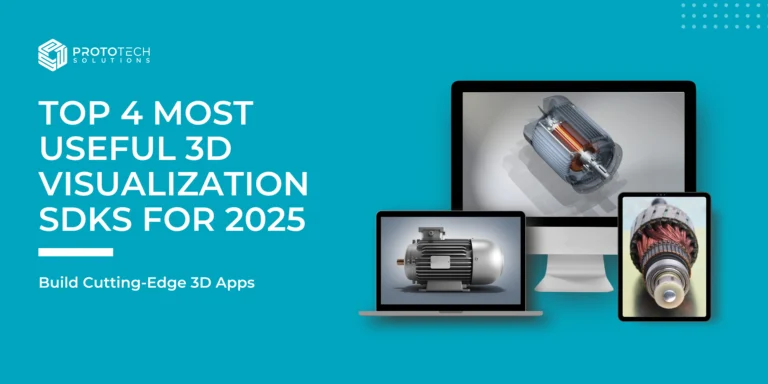Top 6 Benefits of Using Custom VR Training Software for Construction Workers

The global construction industry is on a dynamic growth trajectory, with its market size projected to reach $17.05 trillion in 2025, up from $16.15 trillion in 2024, reflecting a steady CAGR of 5.5%. By 2029, this growth is expected to accelerate further, reaching approximately $21.26 trillion, fueled by urbanization, infrastructure development, and technological advancements. These figures underscore the industry’s critical role in shaping economies worldwide, contributing significantly to employment and Gross domestic product (GDP)
Driving this transformation is the adoption of cutting-edge technologies like Virtual Reality (VR), which is revolutionizing training and operations within the sector. Globally, the VR market is experiencing exponential growth, valued at $15.9 billion in 2024 and forecasted to reach $32.40 billion by 2025, with an astonishing CAGR of 42.05% projected through 2030. VR’s integration with technologies such as 5G and AI is enabling immersive applications across industries ranging from gaming to professional training, including construction.
In construction, Custom VR training software is emerging as a game-changer. By providing realistic simulations for safety protocols, equipment handling, and site navigation, it addresses critical challenges like labor shortages and productivity stagnation while enhancing worker skills and confidence. As both industries grow in tandem, VR’s innovative applications are set to redefine construction practices, paving the way for safer, more efficient project execution globally. Here are the top six benefits of using this innovative approach.
1. Enhanced Safety Training
Safety is paramount in construction, where workers face various hazards daily. Custom VR training allows workers to experience realistic job site scenarios in a safe and controlled environment. For instance, they can practice emergency protocols for equipment malfunctions or hazardous material spills without real-world risks. This immersive experience not only helps workers understand safety protocols better but also builds their confidence in handling emergencies, leading to a significant reduction in workplace accidents and injuries.
2. Better Retention and Engagement
Let’s face it, reading manuals or sitting through long PowerPoint presentations is not the most engaging way to learn. VR training is interactive, which makes learning more engaging and, in turn, more effective. Studies have shown that immersive learning experiences significantly boost information retention compared to traditional training methods.
With custom VR training software, training modules can be designed to mimic actual job sites, making the learning experience highly relevant. Workers can repeatedly practice tasks, reinforcing their knowledge and muscle memory. This hands-on experience ensures that they retain critical safety procedures and operational techniques far better than passive learning methods.
3. Cost-Effective Training Solution
At first glance, investing in VR technology might seem expensive, but in reality, custom VR training software can save construction companies a lot of money in the long run. Here’s how:
- Reduced Need for Physical Equipment: Traditional training often requires using actual construction equipment and materials, which can be costly. VR eliminates this need by providing a simulated environment where workers can practice without wear and tear on real machinery.
- Lower Risk of Accidents: Accidents during training can lead to injuries, medical costs, and lost productivity. VR training significantly reduces these risks.
- Scalability: Once developed, a VR training program can be used to train multiple employees without additional costs for new equipment or trainers.
Instead of shutting down job sites for hands-on training or sending workers to off-site training programs, VR allows workers to train anytime, anywhere, without disrupting daily operations.
4. Personalized Training Experiences
One size does not fit all in construction training. Every job site is different, and different workers have different levels of experience. Custom VR training software can be tailored to meet the specific needs of a company and its workforce.
For example, a new hire might need basic safety training, while an experienced worker might require advanced equipment operation simulations. With a customized VR program, training modules can be adjusted based on a worker’s experience level, specific job role, or even the unique layout of a particular construction site.
Additionally, VR training can provide real-time feedback and performance tracking, allowing companies to identify areas where workers need improvement. This data-driven approach ensures that every worker receives the training they need to perform safely and efficiently on the job.
5. Improved Collaboration and Communication
Custom VR training can also foster better teamwork and communication among construction workers. Many VR platforms allow for multi-user scenarios where trainees can collaborate in a virtual environment, simulating real-life teamwork dynamics on construction sites. This collaborative aspect not only builds essential communication skills but also enhances overall project efficiency by preparing teams to work together effectively from the outset.
As construction projects often involve multiple stakeholders, this improved collaboration can lead to fewer misunderstandings and smoother operations.
6. Flexibility and Accessibility
Another significant advantage of custom VR training software is its flexibility. Workers can access training modules from anywhere at any time, making it particularly beneficial for those in remote locations or with tight schedules. This accessibility ensures that all employees have the opportunity to receive comprehensive training without logistical constraints. Additionally, the ability to repeat exercises as needed allows trainees to learn at their own pace, further enhancing their skills and confidence before stepping onto a real job site.
Final Thoughts

Investing in VR training goes beyond merely adopting new technology; it’s about prioritizing safety, reducing costs, and enhancing overall productivity. As the industry progresses, companies that embrace custom VR training software will gain a competitive edge by fostering a skilled, confident, and safety-conscious workforce.
As the industry evolves, staying ahead means exploring new ways to train, learn, and grow. Could VR be the key to elevating your training programs? If so, the possibilities are limitless.
Now is the time to explore how VR training could reshape the way your team learns and performs. What does the future of construction training look like for you? Connect with ProtoTech’s VR experts today to discover how advanced and premium VR training software can transform your training experience, setting your team up for success. Embrace the future of construction training and watch your business thrive!






